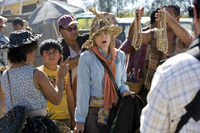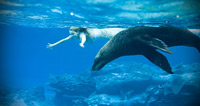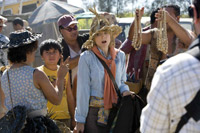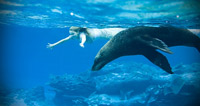Nim’s Island is the latest so-so effort from Walden Media. Like most of their films, it is based on a children’s book, and like many of their films, it is directed by a first-time feature-film director—or, in this case, by two people who have never directed a feature film before. But lest you enter the theater with low expectations, the film is also graced with enthusiastic performances by actors who clearly enjoy being part of a story that teaches positive lessons—and a little enthusiasm can go a long way, even when it is not clear just where the story itself is going.

The part of Nim herself is played by the 11-year-old Abigail Breslin, who was last seen in Definitely Maybe as a young girl who asks her about-to-divorced dad to tell her a bedtime story about his love life. Nim, thankfully, is not so precocious, or at least not in that way; she has spent the bulk of her life with her dad on a remote island in the South Pacific, where she plays with various animals and “escapes” by reading the adventure novels of an Indiana Jones-like figure named Alex Rover.
When she reads these novels, Nim imagines that the dashing, heroic Alex Rover is a man just like her dad, Jack Rusoe (Gerard Butler)—except that where her dad is a marine biologist who hopes to discover a new form of nanoplankton and name it after his daughter, she imagines Alex Rover being a much more rugged, combative individual. To the film’s credit, it allows Jack to be masculine in his own way; the fact that he spends much of his time looking at his one-celled specimens through a microscope does not make him a mild-mannered geek. He is, indeed, an inspirational figure to his daughter in his own way—so when Nim visualizes her father as Alex Rover, it may be not so much because she wishes her father were living a different kind of life, but because her father is already a sort of hero to her.

Confusing matters, though, is the fact that the Alex Rover books seem to be written in the first person, which apparently leads Nim to believe that they are not just adventure fantasies but have some kind of basis in fact. The truth, however, is very, very different: while the hero of the books is definitely a man, the author turns out to be one Alexandra Rover (Jodie Foster), an intensely neurotic woman whose fear of the outside world reaches almost Howard Hughes-like proportions. She hasn’t left her San Francisco apartment in months, she won’t go out to check the mail lest she expose herself to the rain, and she obsessively rubs her hands with Purell hand sanitizer. And her knowledge about all those faraway places that she writes about in her books? It seems to come entirely from the reference books on her shelf.
As it happens, Alexandra is struggling with writer’s block, and as she goes looking for material that she can use in her next book, she chances upon an article written by Jack about the island that he and Nim live on. Alexandra sends an e-mail, and since Jack is away on his boat, Nim receives it and replies to it. Before long, the two have established just enough of a rapport that, when Nim is injured and a monsoon strikes the island—and possibly separates Nim from her father forever—Alexandra feels personally compelled to go to the island and, uh, do whatever she can.

It’s not really clear what Alexandra expects to do once she gets there; the important thing is, she faces her fears—repeatedly—as she leaves her home and makes her way to the island, losing all of her creature comforts along the way. (Her hand sanitizer doesn’t make it past the airport security check; various clothing items are lost at sea.) And what helps her to face these fears is the fact that she, too, visualizes her hero Alex Rover, and imagines that he is goading her on to do all the things that she would do if she were a braver person just like him.
There is an important lesson here about the way in which courage is something we have to imagine, and then commit ourselves to—and about how sometimes, by imagining someone better than we are and then emulating that imaginary person, we can actually become better people ourselves. The lesson is bolstered by something Jack tells his daughter, that courage “is not just in you, it’s in each choice we make, every single day.” Courage is, in a sense, a habit that we need to learn.
The lesson almost gets lost, though, in some of the distractions that the story—written by co-directors Jennifer Flackett and Mark Levin with Joseph Kwong and Paula Mazur, and adapted from the novel by Wendy Orr—throws our way. By some strange coincidence, no sooner has a monsoon overwhelmed Jack’s boat and separated him from the island than a boat full of tourists shows up, apparently oblivious to the weather and ready to pollute the island with their candy bar wrappers.
This forces Nim to go all Home Alone on the tourists, protecting the island with help from the leaping lizards and flatulent sea lions that are her friends—and her encounter with a boy from the boat strikes an odd tone, neither anticipated nor followed up by the rest of the film, and it feels like the remnant of a subplot that got axed somewhere along the line. (Incidentally, Nim tells the animals they will have to fight just like the ancient Greek warriors she has read about; can it be a coincidence that her father is played by the same man who played King Leonidas in 300?)

This is also one of those films that sort of makes a point about the difference between reality and fantasy, yet presents reality in a way that is very unrealistic. The animals that Nim befriends not only understand her and take orders from her, one of them—a pelican—even takes it upon itself to go and find Jack, stranded at sea, and to give him the equipment that he needs to repair his boat and come home. And when Jack, still lost at sea, yells loudly, Nim can hear him miles away over the sounds of the monsoon. The children in the audience probably won’t mind those kinds of fantastic flourishes, but it may dilute the message somewhat.
And then there is the ending, which kind of comes from out of nowhere and, while it resolves one of the film’s more minor aspects, it doesn’t really resolve what had seemed to be the main issue all along. The film ends up seeming more like a patchwork of narrative threads than a fully integrated story, as such. And when you think about it, it’s pretty implausible that Alexandra, who has never met Nim or her father before, would visualize her hero as a more rugged version of Nim’s father, just as Nim does—a detail that may or may not be significant, depending on how you interpret certain scenes.
Still, there is a fair bit to like here. Butler and Breslin are as charming as ever, and it is especially fun to watch Foster, who has been so intensely serious of late, tackle such a silly role, and with such zest. For children, Nim’sIsland is a reasonably diverting bit of entertainment, even if it isn’t the sort of film that would top anyone’s desert-island list.
>Talk About It
Discussion starters- Jack describes courage this way: “It’s not just in you, it’s in each choice we make, every single day.” Is this true? How is courage something we learn? What role do imagination and free will play? Is there anything uniquely human about courage?
- Do you find courage in yourself? Do you find it in others? Do you sometimes find it in imaginary others, the way that Alexandra finds it in her imaginary hero Alex?
- What does Scripture say about courage and its source? (See Joshua 1:9, Matt. 14:27, 1 Cor. 16:13, Phil. 1:20.)
- Before she leaves her apartment, Alexandra says, “I don’t want to touch the world. It’s not sanitary!” Have you ever tried to avoid the world before? Why or why not? Did you ever have to overcome any fears in “touching the world”? How did you do this? Can this be applied to the idea that we should be in the world but not of it?
The Family Corner
For parents to considerNim’s Island is rated PG for mild adventure action (tiny animals being sling-shot onto people’s faces, a giant wave overwhelming a man’s boat, a monsoon strikes the island, a couple of clearly imaginary fights involving the fantasy hero Alex Rover, etc.) and brief language (a couple of “damns” and at least one “oh my God”). There is also a scene involving a flatulent sea lion, and a brief glimpse of a married man videotaping a couple of female tourists on the beach while his wife isn’t looking. Also, a nervous Alexandra vomits off-screen a couple of times because of motion sickness, and she prays, “Please don’t take me now,” while sitting on a plane.
Photos © Copyright Fox Walden
Copyright © 2008 Christianity Today. Click for reprint information.












